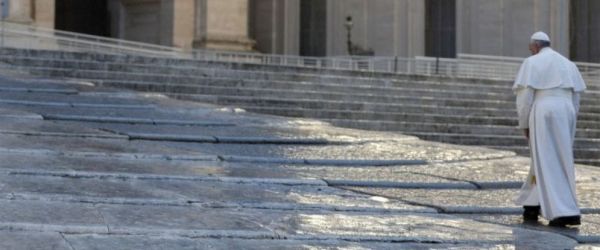The Gospel passage for this first Sunday of Lent (cf. Lk 4:1-13) recounts the experience of the temptation of Jesus in the desert. After fasting for 40 days, Jesus is tempted three times by the devil. First he invites Him to change stone into bread (v. 3); then, from above, he shows Him all the kingdoms of the world and the prospect of becoming a powerful and glorious messiah (vv. 5-6); lastly he takes Him to the pinnacle of the temple of Jerusalem and invites Him to throw himself down, so as to manifest His divine power in a spectacular way (vv. 9-11). The three temptations point to three paths that the world always offers, promising great success, three paths to mislead us: greed for possession — to have, have, have —, human vainglory and the exploitation of God. These are three paths that will lead us to ruin.
The first, the path of greed for possession. This is always the devil’s insidious logic He begins from the natural and legitimate need for nourishment, life, fulfilment, happiness, in order to encourage us to believe that all this is possible without God, or rather, even despite Him. But Jesus countervails, stating: “It is written, ‘Man shall not live by bread alone’’’ (v. 4). Recalling the long journey of the chosen people through the desert, Jesus affirms his desire to fully entrust himself to the providence of the Father, who always takes care of his children.
The second temptation: the path of human vainglory. The devil says: “If you, then, will worship me, it shall all be yours” (v. 7). One can lose all personal dignity if one allows oneself to be corrupted by the idols of money, success and power, in order to achieve one’s own self-affirmation. And one tastes the euphoria of a fleeting joy. And this also leads us to be ‘peacocks’, to vanity, but this vanishes. For this reason Jesus responds: “You shall worship the Lord your God, and him only shall you serve” (v. 8).
And then the third temptation: exploiting God to one’s own advantage. In response to the devil — who, citing Scripture, invites Him to seek a conspicuous miracle from God — Jesus again opposes with the firm decision to remain humble, to remain confident before the Father: “It is said, ‘You shall not tempt the Lord your God’” (v. 12). Thus, he rejects perhaps the most subtle temptation: that of wanting to ‘pull God to our side’, asking him for graces which in reality serve and will serve to satisfy our pride.
These are the paths that are set before us, with the illusion that in this way one can obtain success and happiness. But in reality, they are completely extraneous to God’s mode of action; rather, in fact they distance us from God, because they are the works of Satan. Jesus, personally facing these trials, overcomes temptation three times in order to fully adhere to the Father’s plan. And he reveals the remedies to us: interior life, faith in God, the certainty of his love — the certainty that God loves us, that he is Father, and with this certainty we will overcome every temptation.
But there is one thing to which I would like to draw your attention, something interesting. In responding to the tempter, Jesus does not enter a discussion, but responds to the three challenges with only the Word of God. This teaches us that one does not dialogue with the devil; one must not discuss, one only responds to him with the Word of God.
Therefore, let us benefit from Lent as a privileged time to purify ourselves, to feel God’s comforting presence in our life.
May the maternal intercession of the Virgin Mary, icon of faithfulness to God, sustain us in our journey, helping us to always reject evil and welcome good.
[Pope Francis, Angelus 10 March 2019]












